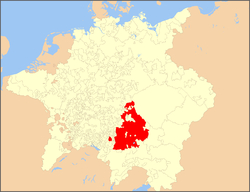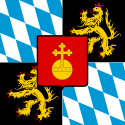
Back Eleutoráu de Baviera AST Bavariya kürfürstlüyü Azerbaijani Kurfürstentum Bayern BAR Баварскае курфюрства Byelorussian Курфюрство Бавария Bulgarian Electorat de Baviera Catalan Bavorské kurfiřtství Czech Kurfyrstendømmet Bayern Danish Kurfürstentum Bayern German Εκλεκτοράτο της Βαυαρίας Greek
Electorate of Bavaria Kurfürstentum Bayern (German) | |||||||||
|---|---|---|---|---|---|---|---|---|---|
| 1623–1806 | |||||||||
Electoral Standard[2]
| |||||||||
 Bavaria highlighted on a map of the Holy Roman Empire in 1648 | |||||||||
| Status | Electorate | ||||||||
| Capital | Munich | ||||||||
| Religion | Catholic Church | ||||||||
| Demonym(s) | Bavarian | ||||||||
| Government | Feudal monarchy | ||||||||
| Elector of Bavaria | |||||||||
• 1623–1651 | Maximilian I, Elector of Bavaria | ||||||||
• 1651–1679 | Ferdinand Maria, Elector of Bavaria | ||||||||
• 1679–1726 | Maximilian II Emanuel, Elector of Bavaria | ||||||||
• 1726–1745 | Karl Albrecht, Elector of Bavaria | ||||||||
• 1745–1777 | Maximilian III Joseph, Elector of Bavaria | ||||||||
• 1777–1799 | Karl Theodor, Elector of Bavaria | ||||||||
• 1799–1805 | Maximilian IV Joseph, Elector of Bavaria | ||||||||
| Historical era | Early modern Europe | ||||||||
• Granted electoral dignity | 1623 | ||||||||
• Peace of Westphalia | 1648 | ||||||||
• Put under imperial ban | 1706 | ||||||||
• Imperial ban reversed | 1714 | ||||||||
1777 | |||||||||
• Raised to Kingdom | 1806 | ||||||||
| |||||||||
The Electorate of Bavaria (German: Kurfürstentum Bayern) was a quasi-independent hereditary electorate of the Holy Roman Empire from 1623 to 1806, when it was succeeded by the Kingdom of Bavaria.[3]
The Wittelsbach dynasty which ruled the Duchy of Bavaria was the younger branch of the family which also ruled the Electoral Palatinate. The head of the elder branch was one of the seven prince-electors of the Holy Roman Empire according to the Golden Bull of 1356, but Bavaria was excluded from the electoral dignity. In 1621, Frederick V, Elector Palatine was put under the imperial ban for his role in the Bohemian Revolt against Ferdinand II, Holy Roman Emperor, and the electoral dignity and territory of the Upper Palatinate was conferred upon his loyal cousin, Duke Maximilian I of Bavaria. Although the Peace of Westphalia would create a new electoral title for Frederick V's son, with the exception of a brief period during the War of the Spanish Succession, Maximilian's descendants would continue to hold the original electoral dignity until the extinction of his line in 1777. At that point the two lines were joined in personal union until the end of the Holy Roman Empire. In 1805, after the Peace of Pressburg, the then-elector, Maximilian Joseph, raised himself to the dignity of King of Bavaria, and the Holy Roman Empire was abolished the year after.
- ^ Based on original preserved depictions:
-
The catholic Church of St. Johann Baptist in Oberviechtach
-
The catholic Church of the Visitation of the Virgin Mary in Gottmannshofen
-
- ^ Standarte des Kürfursts - reported 1860. http://www.crwflags.com/fotw/flags/de-by_el.html#blh
- ^ Otto Von Pivka (November 1980). Napoleon's German Allies. Osprey Publishing. pp. 3–. ISBN 978-0-85045-373-7. Retrieved 4 July 2012.[permanent dead link]

![Coat of arms[1] (1623–1777) of Bavaria](http://upload.wikimedia.org/wikipedia/commons/thumb/6/65/Coat_of_Arms_of_the_Electorate_of_Bavaria_1753.svg/110px-Coat_of_Arms_of_the_Electorate_of_Bavaria_1753.svg.png)

